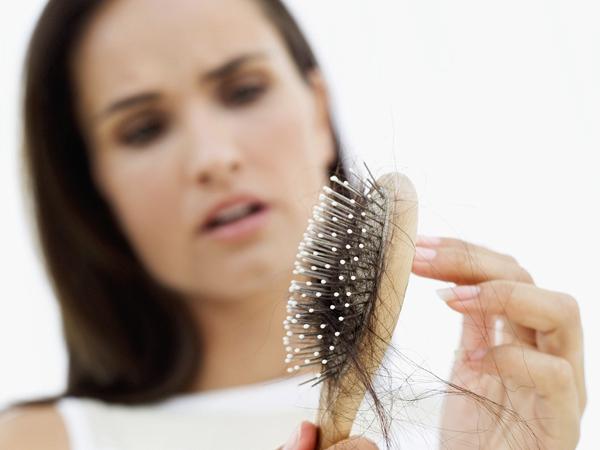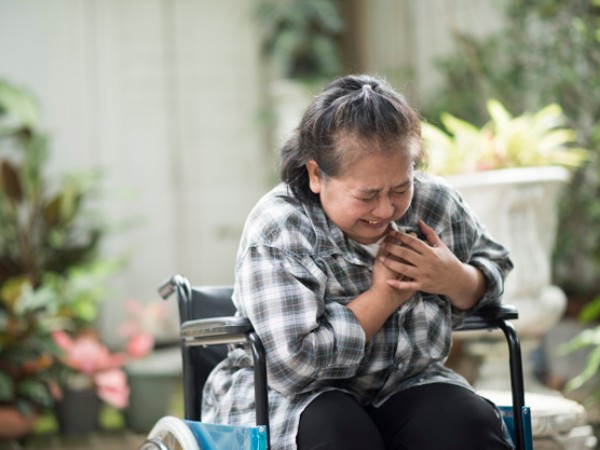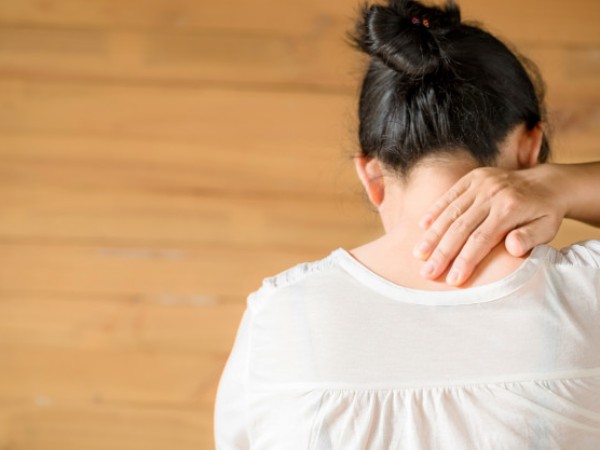
A. Women In Their 20s
Doctors emphasise that women in their 20s should get regular health check-ups during this phase. The body undergoes major hormonal shifts [1]. The following are some of the diseases, which are commonly reported in women in their 20s.
1. Lupus
Lupus is an autoimmune disease that typically affects around 1.5 million people in the United States of America and almost over 5 million people worldwide. Most patients who have lupus are women, and many of them are quite young. For this reason, women in their 20s should regularly do health check-ups and visit the doctors [2].
The symptoms of lupus vary from person to person, but symptoms may include rashes, mood swings, exhaustion and headaches. It is a severe disease, especially for women who are just in their twenties [3].
2. Fibromyalgia
The women who have this type of disease feel extreme pain in their muscles and joints and feel easily fatigued by their everyday tasks. Even simple activities, like driving a car or walking down the lane, can cause pain. While many people think that the disease usually occurs in elderly persons, but for a change, one can observe this disease frequently in women in their 20 [4].
3. Rheumatoid Arthritis
Rheumatoid arthritis has a probability of occurrence in both men and women in their 20s. If other people in one’s family have any autoimmune diseases, they are more likely to develop this disease or any other autoimmune diseases. And if rheumatoid arthritis runs in one’s family, then smoking can increase one’s risk of getting rheumatoid arthritis. There is no cure for this disease, but anti-inflammatory drugs and steroids may help give relief [5].

4. Crohn’s Disease
Crohn’s disease usually develops during your 20s. Those who have the autoimmune disease experience healthy cells attacking within themselves, leading to swelling in the patients’ GI tract. Cramping, bloating, diarrhoea, and abdominal pain are all common symptoms in the early stages. As the disease progresses, the risk of colon cancer and malnutrition increases [6].
5. Schizophrenia
Schizophrenic symptoms and behaviours usually start in patients in their early 20s. In contrast, women are more commonly affected in their late 20s. While some people may experience a sudden personality change or sudden damage and upheavals in the characteristics, most others gradually show symptoms. And many people who are experiencing delusions typically are not aware of their strange behaviours, thus paving the way for a terrible mental disease, i.e., schizophrenia [7].
Generally, schizophrenia symptoms are thought to be among those who have delusions, hallucinations, and are unbalanced while they are speaking. These patients may also have difficulty expressing their emotions, and they, regularly, appear to be agitated or disorganised. Schizophrenia patterns differ in different patients [8][9].
6. Acne
While it is not a ‘disease’ per se, acne is termed as a medical condition. One may think that breakouts and oily skin are regular teenagers, but not everybody overcame this effect. In fact, acne may first develop for some adults when they have crossed their 20s. This is especially true for women [10].
7. Non-Viable Pregnancy Symptoms
Some women in their late 20s and moving towards 30s might have pregnancy complications or complication of having a miscarriage or some non-viable pregnancy. Many experts feel that this can result from food habits and the hybridised vegetables and impure foods we eat almost every day [11].

B. Women In Their 30s
Taking good care of one’s health post 30 is important not to have to struggle with major diseases and ailments. Read on to know some of the top health warnings that every woman entering her 30s should be aware of.
8. Lumps In Breasts Or Changing Skin Texture Of Breasts
Although breast cancer can occur at any age, it is more common in middle-aged women. The risk of breast cancer goes up as you age. Keep a look for any form of changes in the breast. The presence of lumps or a sudden change in your breast’s texture, along with changes in the nipple, could indicate breast cancer [12]. Early detection of cancer will ease your cancer treatment journey.
9. Endometriosis
Endometriosis is a painful gynaecological disorder that affects between 6 and 10 per cent of women. It occurs when the endometrial tissues grow outside the uterus. This affects the ovaries, fallopian tubes, lymph nodes, and peritoneum. Endometriosis can happen in any girl or woman, but it is more common in women in their 30s and 40s.
10. Hair Loss
Unexpected hair loss is one thing you should look out for once you enter your 30s. It is common to lose between 50 to 100 strands of hair daily; however, excessive hair shedding due to the follicle not growing could indicate serious health issues. Stress and childbirth are prime reasons for excessive hair loss [13].
One in every four women suffers from hair thinning and hair loss. About 95 per cent of these are a case of androgenetic alopecia. One of the common causes of hair loss once you enter your 30s is the lack of important nutrients in your body. Technically, iron deficiency can cause severe hair loss. Once in your 30s, do get your haemoglobin levels checked often to determine if you have anaemia. Hair loss can also occur due to vitamin D deficiency. Hormonal imbalances (sometimes caused due to the intake of contraceptives) can also lead to severe hair loss [14].
11. High Blood Pressure
Being overweight, taking birth control pills, or hormone therapy are reasons why a woman can have high blood pressure. Some diet pills and antidepressants can also lead to high blood pressure issues. A woman with high blood pressure history can also face complications during pregnancy and, therefore, would require close monitoring. Excessive salt intake post 30 years of age has also been associated with increased blood pressure [15].
READ RELATED: List Of Foods That Help Manage Drug And Alcohol Cravings
Stress, along with lack of physical activity (especially in jobs that require you to sit at a stretch for long hours), can also lead to hypertension. High blood pressure can lead to kidney disease and kidney failure. Hypertension, when left untreated, damages the blood vessels and filters in the kidney. This makes the removal of the waste from the body extremely difficult [16].

12. Fatigue
One of the top concerns among women who are 30 plus is fatigue. There could be other health issues that signal fatigue as one of its signs. Thyroid problems are widespread, and this issue can tire you out easily. Proper thyroid medication can help you treat this disorder [17]. Chronic fatigue syndrome is a complex disorder characterised by extreme fatigue. Although the cause is unknown, you might need to get several medical tests to determine the ultimate culprit. Anaemia and diabetes also cause fatigue. Post 30, it is essential that you get yourself checked for anaemia and high blood sugar at regular intervals.
13. Weight Gain
A sudden abnormal drastic weight gain could signal various health issues. Irrespective of how well you exercise or even how good your diet is, if you face a tough time losing weight, it could be due to ailments such as thyroid, cholesterol, diabetes or PCOS. It is important that once you enter your 30s, you should get a regular thyroid screening along with tests for cholesterol and diabetes [18]. Women with PCOS (polycystic ovary syndrome) might find it difficult to lose weight. This is a hormone disorder, and women with PCOS have high levels of male hormone and are insulin resistant. These women are also at a high risk of suffering from diabetes and various heart-related issues [19].
14. Reduced Vision
One of the prime reasons why vision is affected after 30 years is nutritional deficiency. Deficiency of vitamins A, C, and E and zinc can lead to blurred vision. These nutrients are highly essential to slow down macular degeneration that occurs with age. Regular attacks of migraine can cause vision-related issues. Aura is one such vision ailment that involves blind spots and flashing lights. This usually occurs in both eyes. The eye’s visual pathways can also be affected due to the damage caused in the brain after a stroke [20].
15. Difficulty In Conceiving
Research points out that a woman’s chances of becoming pregnant begin to decline in the mid-30s. The decline of fertility is ideally associated with reduced frequency of ovulation, decreased cervical fluid, bad quality of eggs and increased chronic health issues. However, sometimes it is not just these issues. After you turn 30, the cause of infertility could vary. A hormonal imbalance, tumour or cyst could be the possible reason you might face difficulty getting pregnant [21].

C. Women In Their 40s And Above
Once you hit your 40s, your health risks change over time. The health concern you had at 20 may not necessarily be a concern at 40. However, here are some of the most common health concerns women can face during their 40s and after.
16. Heart Diseases
According to studies, women have a much higher risk of death by heart diseases. Unhealthy eating habits, extremely hectic lifestyles, smoking, diabetes etc., are the major hazards that put you at heart diseases. Even the symptoms of heart attacks or strokes are different in women. Unlike the chest pain in men during an attack, women may not feel exact chest pain. Still, they might feel very weak, experience shortness of breath, vomiting, arm pain etc. which could be misunderstood for the signs of flu or normal body-ache [22].
17. Breast Cancer
The risk of a woman developing breast cancer increases between 30 and 40 [23]. At age 30, the chance of a woman developing breast cancer is significantly lower than at 40. Therefore, you need to undergo regular breast exams, annual mammograms etc., to reduce your chances of developing breast cancer and can aid in early treatment if it does develop.
18. Diabetes
Women in their 40s and above are at an increased risk of developing diabetes. Diabetes is the number six cause of death in women aged 45 to 54. Studies point out that a healthy diet and regular exercise can help reverse the effects of prediabetes.

19. Osteoporosis
Bone loss is a part of getting older, especially for women, as this commences immediately after menopause. Doctors advise women to add a good amount of vitamin D, exercise well, eat a well-balanced diet, and get their bone density tested if they have risk factors.
20. Adult-Onset Asthma
In women after 40, hormonal fluctuations like those occurring during perimenopause and menopause can contribute to the onset of asthma [24]. Asthma is treatable, so if you have a nagging, persistent cough, get winded and cannot catch your breath for a long period after or are wheezing, seek medical attention.
21. Vitamin Deficiency
One of the major health issues reported in women over 40 is vitamin deficiency. As women age, vitamin deficiencies become even more common and can cause many health disorders [25]. Low vitamin D has been linked to depression and seasonal affective disorder, as well as bone-mass loss.
Some of the other health issues reported in women over 40 are as follows:
- Blood clots
- Overactive bladder
- Kidney stones
- Urinary tract and prostate infections
- Back pain
- Depression
- Anaemia

On A Final Note…
Ignoring the signs of a health issue will make its treatment quite difficult later on. Your body is designed to show signs once there is some illness making an appearance. You are responsible for understanding these signals and seeking appropriate medical advice so that the healing process can begin.
Experts state that women should make it a point to pay monthly visits to the doctor for their overall check-ups. These medical visits will help you to be more aware in case you are suffering from any disease.
Happy Women’s Day!
Source:










